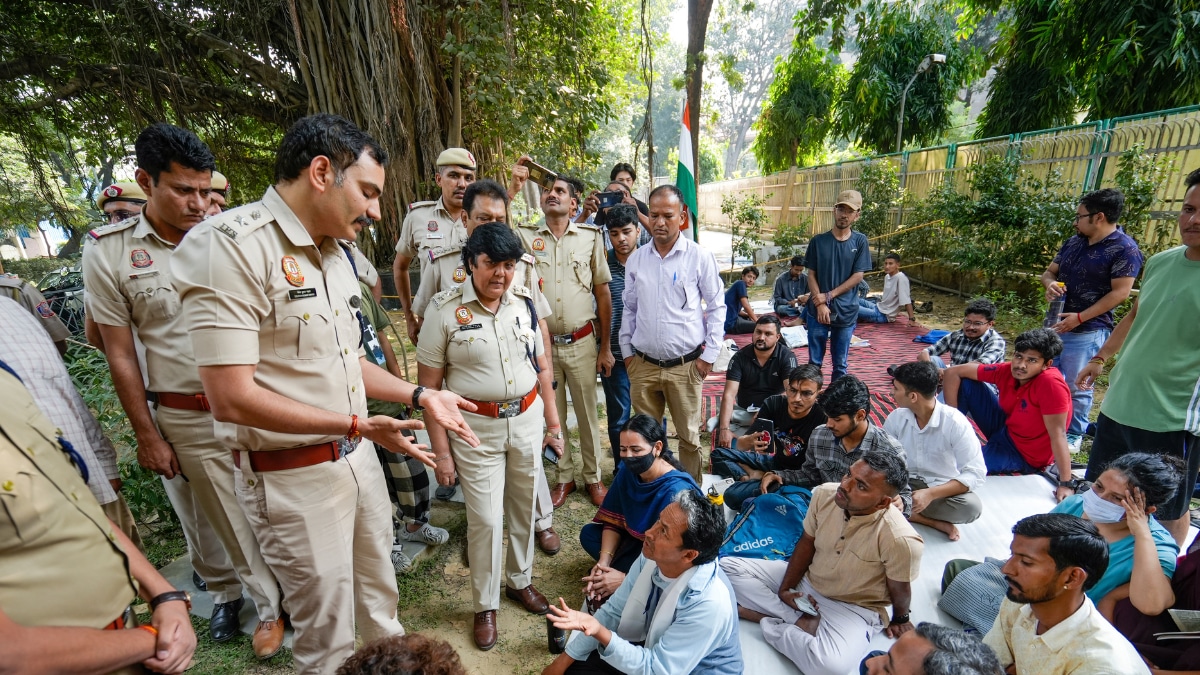Climate activist Sonam Wangchuk’s indefinite hunger strike in Delhi has been met with strong police action, highlighting concerns about the right to peaceful protest and the implementation of laws restricting public gatherings in India.
Restrictions on Peaceful Assembly in Delhi
The Delhi Police detained several supporters of Sonam Wangchuk who gathered outside the Ladakh Bhawan to observe a silent protest. This action sparked concerns about the limitations placed on public gatherings in the capital, specifically citing Section 163 of the Bharatiya Nagarik Suraksha Sanhita (BNSS).
Section 163 and Its Implications
This section prohibits unauthorized gatherings and is often used by authorities to prevent protests or gatherings that are deemed disruptive or potentially dangerous. While the Delhi Police claimed that the protesters were detained for not having permission to gather outside the Ladakh Bhawan, Wangchuk argued that the permanent enforcement of Section 163 stifles fundamental democratic rights. He raised the question of how a country that claims to be the world’s largest democracy can restrict even peaceful protests. He emphasized that such laws should only be imposed temporarily in cases where there is a real threat to public order.
Criticism of Section 163’s Permanent Enforcement
The permanent application of Section 163 has been criticized for its potential to stifle dissent and limit the freedom of assembly, a fundamental right guaranteed under the Indian Constitution. Critics argue that this type of blanket ban on gatherings can have a chilling effect on civic engagement and suppress diverse voices in a democratic society. They point out that it can also lead to arbitrary arrests and unfair treatment of those who wish to exercise their right to assemble peacefully.
The Struggle for Recognition and Autonomy
The ongoing hunger strike led by Sonam Wangchuk and the accompanying protest underscore the long-standing demands of the people of Ladakh for greater autonomy and recognition. Their goal is to achieve statehood for Ladakh and have it included in the Sixth Schedule of the Constitution. The inclusion in the Sixth Schedule would grant Ladakh’s tribal communities more control over their land, resources, and culture, similar to the protections granted to tribal areas in northeast India.
The Significance of the Sixth Schedule
The Sixth Schedule of the Constitution was established to protect and empower tribal communities in Northeast India by granting them greater autonomy and self-governance. The communities have a degree of self-determination through the formation of autonomous district councils with legislative, judicial, executive, and financial powers.
Ladakh’s Demand for Inclusion
Ladakh’s demand for inclusion in the Sixth Schedule is fueled by the desire to safeguard its unique cultural identity, preserve its environment, and gain more control over its resources. The people of Ladakh believe that inclusion in the Sixth Schedule will protect their interests, prevent outside exploitation, and allow them to govern themselves more effectively.
The Implications of Detaining Protest Leaders
The detention of several individuals involved in the protest, including some who travelled from Leh to Delhi to join Wangchuk, highlights the growing tension between the protesters’ demands and the government’s response. While the Delhi Police have released these detainees, the incident underscores the potential for further conflicts as the protest continues.
Impact on the Movement’s Momentum
The detention of supporters could have a chilling effect on the protest movement. This tactic is often employed by authorities to intimidate and discourage participation in dissent movements, particularly those with a strong message and growing public support. However, the continued determination of the protesters and their commitment to their cause may inspire others to stand with them in demanding their rightful place in India’s federal structure.
Takeaway Points
The recent events in Delhi demonstrate the challenges facing the right to protest in a democratic society. The ongoing protest raises crucial questions about the delicate balance between maintaining public order and protecting fundamental rights, especially the right to freedom of assembly.
The permanent enforcement of laws like Section 163, along with the selective use of detentions as a means to control dissent, raise serious concerns about the shrinking space for free expression in India. It also highlights the importance of ensuring fair and impartial enforcement of laws while upholding the rights of individuals to voice their concerns and advocate for change peacefully.
This conflict also shines a light on the need for genuine dialogue and constructive engagement between the government and the people of Ladakh to address their demands and reach a mutually agreeable solution. Addressing the aspirations for self-governance and representation, through mechanisms like the Sixth Schedule, can foster a sense of inclusion and create a more equitable and sustainable future for Ladakh.




